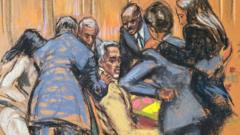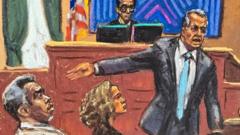An investigation reveals disturbing insights from ex-employees of Bad Boy Records, detailing allegations of sexual misconduct, threats, and a toxic culture that flourished under Sean “Diddy” Combs in the 1990s.
Unveiling the Dark Side of Diddy's Music Empire: Secrets from the 90s

Unveiling the Dark Side of Diddy's Music Empire: Secrets from the 90s
Former insiders share alarming accounts of Sean "Diddy" Combs' behavior at Bad Boy Records, shedding light on a culture rife with misconduct during the label's height.
As Sean "Diddy" Combs awaits trial on serious charges, revelations from former associates of his music label, Bad Boy Records, paint a troubling picture of the culture that thrived during the label's exceptional rise in the 1990s. According to over 20 interviews conducted by BBC News, those who once worked closely with Combs share alarming insights into alleged illegal activities, inappropriate conduct, and a threatening atmosphere that pervaded the label.
Former music executive Daniel Evans recounted a harrowing memory from 1997, when Combs allegedly made a stark threat to a colleague, claiming he could easily hire someone to kill them without consequence. This incident exemplified the power dynamic at play as Bad Boy Records celebrated its success with lucrative deals and skyrocketing fame. Worth $6 million as the label broadened its influence across fashion and entertainment, Combs' transformation from an ambitious entrepreneur to a feared mogul allegedly isolated those around him.
As allegations resurface nearly three decades later, Combs finds himself facing severe legal troubles, including numerous lawsuits related to claims of drugging and assault. He has consistently denied the allegations. Former staff members recount alarming occurrences that seemed unremarkable at the time but take on a darker context in retrospect, including incidents of Combs engaging in sexual activities in the studio and utilizing corporate funds to bring women for personal gratification.
Tony Buzbee, an attorney representing several alleged victims, states that troubling patterns of behavior date back to the label's inception, with claims of intimidation persisting throughout. One key allegation involves a woman who claims she was raped by Combs during a promotional party for The Notorious B.I.G. This lawsuit asserts Combs threatened her life for speaking out, which echoes earlier accounts of coercive threats from within the label.
While Combs built a high-profile lifestyle, hosting lavish parties attended by celebrities like former President Donald Trump, others describe an unsettling culture behind the glamour. Felicia Newsome, a former studio manager, described the environment at Daddy's House recording studio, where inappropriate behavior was rampant yet often overlooked. Despite attempts to assert boundaries, unsettling encounters and misconduct persisted among staff, some of whom faced other pressures like inexperience and youth.
Many staff members, shocked by the lawsuits and allegations now surfacing, struggle to reconcile their experiences with the man they knew. Evans admitted that he initially dismissed some claims until witnessing footage of Combs violently attacking his former partner in 2016, serving as a stark reminder of a darker side.
The forthcoming trial in May is poised to bring further scrutiny as the public awaits more revelations about Sean Combs and Bad Boy Records. Many insiders express uncertainty about the true nature of the hip-hop mogul, wondering whether his past actions reveal a deep-seated arrogance amplified by financial success. As the narrative surrounding Combs unfolds, questions about accountability, power, and the consequences of fame are destined to resonate across the music industry and beyond.



















